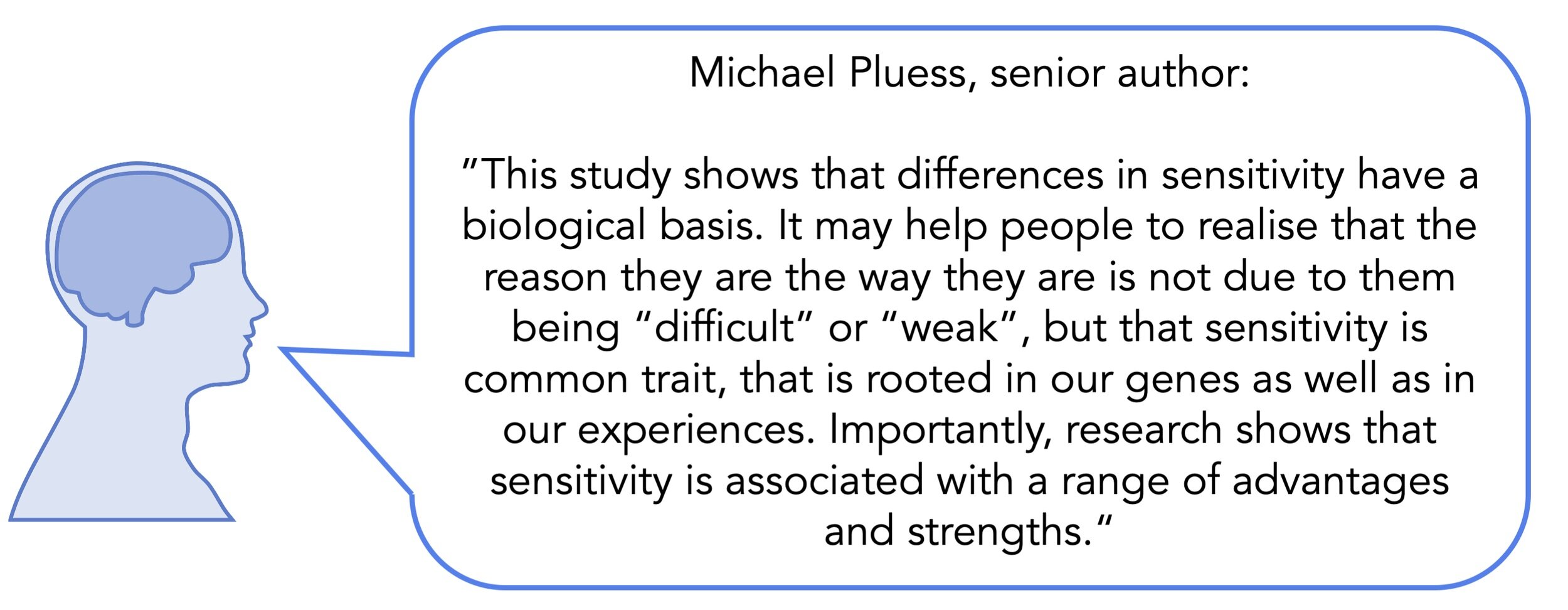Environmental Sensitivity is Heritable and Correlates with Personality Traits
Post by Amanda McFarlan
What's the science?
Environmental Sensitivity is a phenomenon that describes an individual’s sensitivity to being influenced by environmental factors, with some individuals being more susceptible than others. These sensitivities can have both positive and negative effects. For example, an individual may receive a greater benefit from a positive environment while also being more reactive to adverse events. It has been suggested that Environmental Sensitivity likely has a genetic component, however, there have yet to be any studies examining its heritability. This week in Molecular Psychiatry, Assary and colleagues investigated the heritability of Environmental Sensitivity. Additionally, they determined whether the heritability of Environmental Sensitivity shared genetic factors that overlap with common personality traits.
How did they do it?
In order to study the heritability of Environmental Sensitivity, the authors used a subset of data that was collected from pairs of 17-year-old monozygotic, same-sex dizygotic and opposite sex twins as part of a large, longitudinal twin study known as the Twins Early Development Study. To assess the heritability of sensitivity, the authors analyzed the data collected from the Highly Sensitive Child scale which measures three key components of sensitivity: low sensory threshold, ease of excitation, and aesthetic sensitivity (i.e. appreciation for aesthetics, details). Additionally, they analyzed data from the five factor model rating form, a personality test that measures levels of neuroticism, openness, conscientiousness, agreeableness, and extraversion. The authors used three different models to quantify different aspects of their data. First, they used a univariate model to assess the heritability of sensitivity. Second, they used the common pathway model to determine the degree to which common and specific genetic effects contribute to the variance of each of the three components of sensitivity. Finally, they used the independent pathway model to investigate the degree to which common and specific effects, either genetic or environmental, contribute to the variance of sensitivity and personality traits.
What did they find?
The authors determined that 47% of the variation in Environmental Sensitivity could be attributed to genetic influences, while non-shared environmental influences accounted for the remaining 53%, suggesting that sensitivity is a heritable trait. Next, the authors found that each of the three components of Environmental Sensitivity was heritable, with ease of excitation demonstrating the strongest level of heritability, followed by low sensory threshold and aesthetic sensitivity. They found that common genetic and environmental influences explained most of the variance for ease of excitation, while the majority of variance for aesthetic sensitivity was explained by genetic and environmental influences that were specific to that component. The variance for low sensory threshold, however, was explained by genetic and environmental influences that were both common and specific to that component. Finally, of the five personality traits that were measured, the authors found that genetic influences associated with neuroticism and extraversion also contributed to the heritability of sensitivity. Conversely, they did not find any correlation between the environmental factors that influence the five personality traits and those that contribute to the heritability of sensitivity.
What’s the impact?
This is the first study to show that Environmental Sensitivity is a heritable trait that shares genetic influences with neuroticism and extraversion. The authors also found that all three components of Environmental Sensitivity, as measured by the Highly Sensitive Child Scale, were heritable. Together, these findings provide many promising avenues for future studies, including uncovering the specific genetic factors that are shared between sensitivity and personality traits.
Assary et al. Genetic architecture of Environmental Sensitivity reflects multiple heritable components: a twin study with adolescents. Molecular Psychiatry (2020). Access the original scientific publication here.

